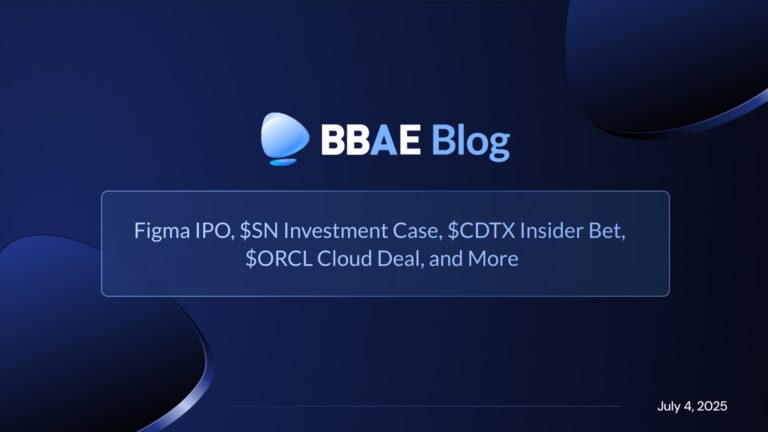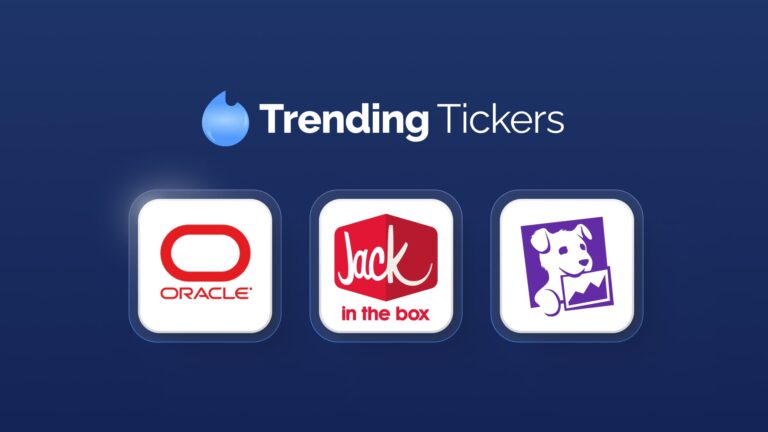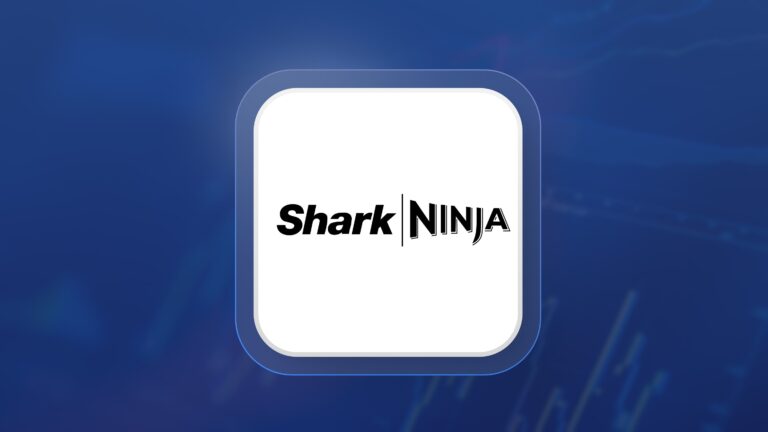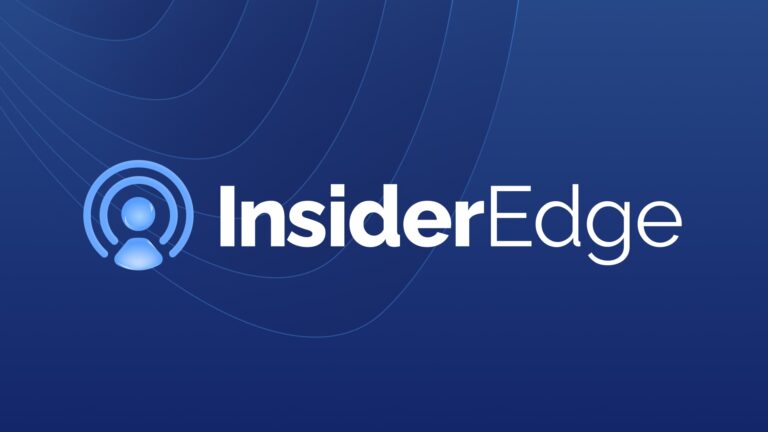Recently, Delta Airlines (DAL) made headlines by restructuring its highly successful SkyMiles loyalty program, which caused an uproar among its customers. Delta implemented measures that make it more challenging for SkyMiles members like me to access airport lounges and other program perks. This decision received widespread criticism on X (formerly known as Twitter), with users expressing extreme dissatisfaction. This got me thinking. Is Delta killing its golden goose? Let’s take a look.
During a recent investor presentation, Delta CEO Ed Bastion revealed that the SkyMiles partnership with American Express is projected to generate nearly $6.5 billion in revenue for Delta in 2023.
Delta disclosed that consumer charge volume on the co-branded AMEX cards is approaching 1% of U.S. GDP, which places volume a bit south of $255 billion per year.
These figures are staggering. Very simply, Delta generates revenue when customers spend on daily purchases using their Delta branded AMEX card.
The key point that’s likely to be overlooked: these purchases have nothing to do with travel! From Delta’s perspective, the American Express deal is nearly a separate – and less volatile — business from its mainstay cyclical, capital intensive airline business.
I’m not sure that investors are recognizing the significance of this revenue stream.
Transparency (or lack of it) may be one reason: Delta does not provide a detailed breakdown of the cost structure related to the revenue generated by the loyalty program. While I can’t be certain, I believe that the margins on this loyalty program could be approaching 50%. If that is the case, Delta could potentially be earning $3.25 billion in EBITDA from the SkyMiles program alone in 2023.
Delta: Half an Airline Business, Half a Credit Card Business (almost)
Scale that number: Delta generated $7 billion of total EBITDA in the trailing 12 months. So if my $3.25 billion estimate is true, it means that nearly half of Delta’s profits (EBITDA is a quick-and-dirty profit measure, to be fair) are coming from a credit card business that it literally outsources.
It gets better: Delta took in nearly $56 billion in revenue over the past 12 months to generate that $7 billion in EBITDA. We can use sloppy math and estimate that if Delta’s SkyMiles remuneration from American Express will be $6.5 billion in 2023, it might equate to slightly less – say, $6 billion – over the past 12 months.
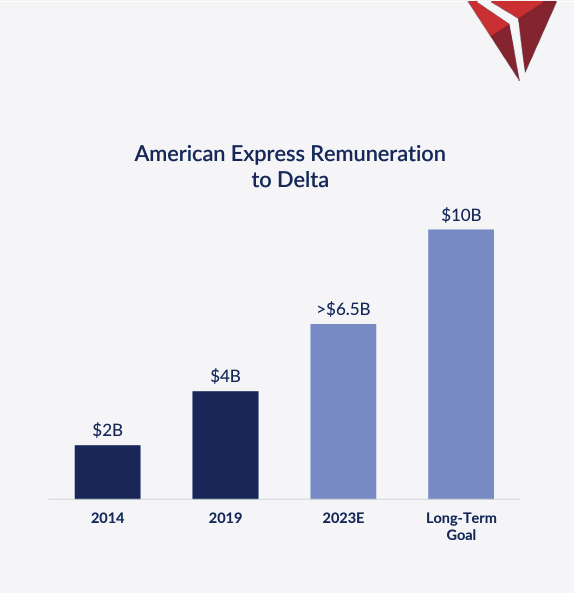
Source: Delta Investor Presentation June 2023
So $56 billion in revenue gets us to $7 billion in overall Delta EBITDA, but if we carve out the credit card business, the airline business is taking in $50 billion in revenue leading to (an estimated) $4.00 billion in EBITDA.
This gives Delta’s airline business a ~7% EBITDA margin.
Meanwhile, that (again, estimated) $6 billion in last-12-month credit card remuneration yields a whopping $3.00 billion in EBITDA.
Now, Delta needs the airline business to offer the credit card business, and American Express presumably has the power to one day change its mind or change deal terms. But the point is that profit matters more than revenue for a business, and as best we can tell, Delta is on its way to become equal parts airline and credit card company.
Why does this matter to investors?
Aside from the huge difference in estimated profit above, cash flows tied to general consumer spending tend to be more reliable (i.e., valuable) than cash flows tied to airline travel. And besides just being much higher, the profits tend to be more consistent, too: things like high capital expenditures, union salaries, and strikes have made US airlines (including Delta) notorious for being in and out of bankruptcy.
In other words, not only is the credit card business’ EBITDA margin juicier, but the market tends to assign much higher multiples to reliable profits like those than it would to similarly sized profits generated by the cyclical airline industry.
Let’s consider financial technology companies like PayPal, which also benefits from “sticky” payment processing revenue. PayPal, with a market capitalization of nearly $65 billion, trades at a multiple of 16 times trailing earnings (more than twice Delta’s multiple) and 10 times next year’s earnings. The valuation multiples of payment processors like Adyen and privately held Stripe are even higher.
In fact, Delta’s “two businesses” discrepancy may be so great that I wouldn’t be surprised to see the company split off a minority stake of its SkyMiles business eventually, under the logic that keeping the more-attractive SkyMiles business moored to the less-attractive airline business depresses SkyMiles’ valuation.
If the market agrees that separating SkyMiles would unlock value, then such a transaction – if it were to happen – would be a win for existing shareholders, who already own SkyMiles by virtue of owning Delta.
As for now, SkyMiles details remain buried in Delta’s overall financials, leaving investors to estimate their actual impact and value contribution to the company. And, some might say, potentially undervaluing them.
Happy Investing,
Barry
Disclaimer: This article is for informational purposes only and is neither investment advice nor a solicitation to buy or sell securities. Investing carries inherent risks. Always conduct thorough research or consult with a financial expert before making any investment decisions.
BBAE Discover: Navigating the U.S Airlines Landscape
Navigating the world of U.S. Airline stocks can be daunting. BBAE Discover simplifies this journey by providing valuable insights and resources specifically related to U.S. airline companies in the public market:
- Curated Investment Themes: Explore stocks and portfolios specifically related to the U.S. Airline industry. BBAE Discover offers a comprehensive overview of potential investment opportunities in the U.S. Airline sector.
- In-depth Trends Analysis: Stay updated on the latest trends, opportunities, and challenges within the U.S. Airline sector. BBAE Discover provides in-depth analysis of market trends, technological advancements, policy changes, and market forecasts that impact the industry.
- Market Sector Exploration: Delve into the U.S. airline ecosystem. BBAE Discover allows you to explore the different components of the U.S. airline sector.
For a full list of all companies in the BBAE Discover curated portfolio for U.S. Airline Stocks, please click here.
BBAE Discover is more than just a tool; it’s an investment compass, guiding investors through the intricate landscape of U.S. airlines. By aligning trading decisions with interests and values, BBAE Discover empowers investors to invest with clarity and confidence in sectors that are redefining transportation and shaping the future.



